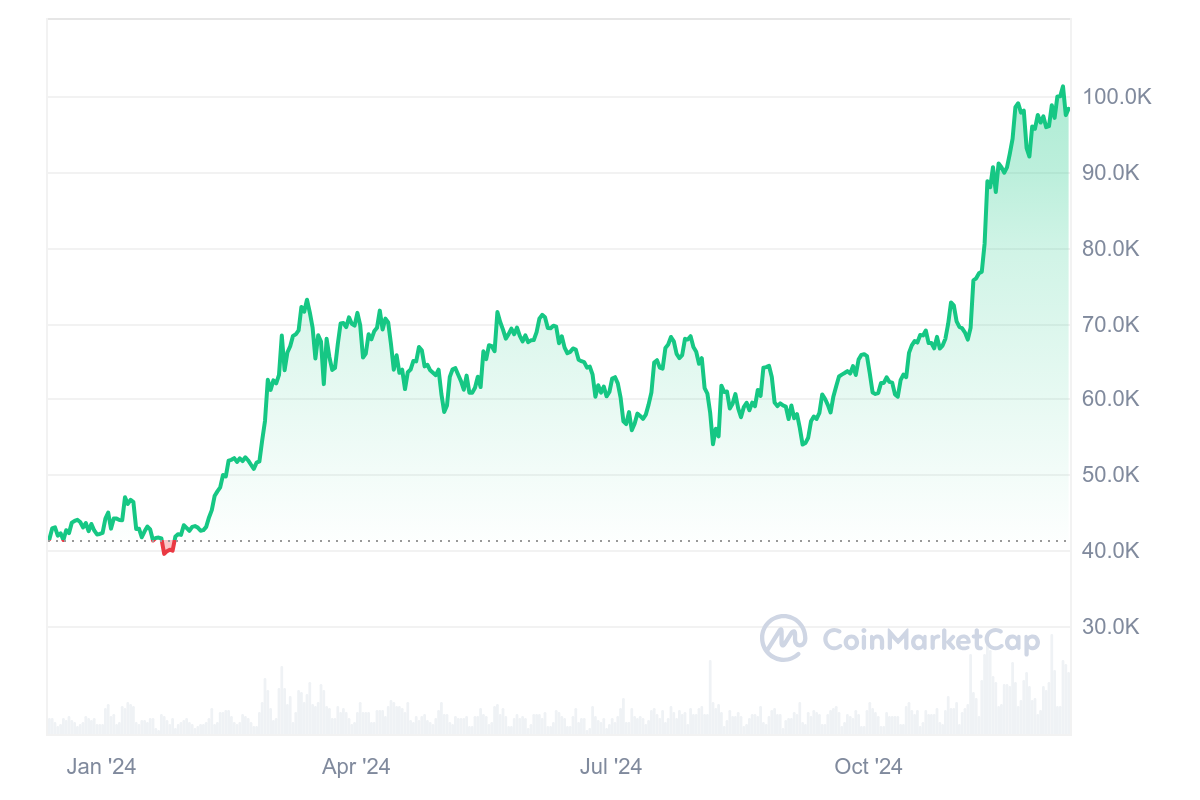Bitcoin’s Record Highs and U.S. Job Market Trends
Bitcoin’s Record Highs and U.S. Job Market Trends: Decoding Global Economic Shifts
Introduction:
The global economy is undergoing transformative changes, highlighted by two key developments: Bitcoin’s unprecedented surge to $100,000 and the rise in U.S. job vacancies to 7.7 million. Although these events come from distinct sectors—digital finance and traditional labor markets—they reflect broader trends shaping the future of global market dynamics.
BTC Chart
View Bitcoin Price Chart
Bitcoin’s Surge to $100K: A Milestone for Digital Assets
Bitcoin’s rise to $100,000 marks a pivotal moment in its journey to becoming a mainstream financial asset. Several factors have driven this growth:
- Institutional Adoption:
Investment giants like BlackRock and Fidelity have launched Bitcoin ETFs, attracting billions in capital inflows and boosting confidence in digital assets. - Supportive Policies:
Former U.S. President Donald Trump’s pro-crypto stance, including proposals for a national Bitcoin reserve, has spurred market enthusiasm. - Inflation Hedge:
Amid rising inflation and economic uncertainties, Bitcoin’s decentralized nature and limited supply make it an appealing store of value.
The U.S. Labor Market’s Resurgence
Simultaneously, the U.S. labor market has shown strong signs of recovery, with job openings hitting 7.7 million. Key drivers include:
- Economic Rebound:
Sectors like hospitality, retail, and technology are ramping up hiring to meet rising consumer demand. - Worker Mobility:
An increase in worker confidence has led to higher resignation rates, signaling optimism in finding better opportunities. - Technological Transformation:
The adoption of digital tools and automation is reshaping job roles, creating demand for tech-savvy professionals.
Interconnection Between Digital and Traditional Economies
Although Bitcoin’s rise and labor market trends might appear disconnected, they share underlying economic drivers:
- Technological Advancements:
Blockchain technology, which underpins Bitcoin, is being adopted across industries, such as supply chain management and financial services, driving innovation and creating new job opportunities. - Capital Flow Shifts:
Institutional investments in digital assets are shifting capital from traditional sectors to emerging technologies, influencing labor market dynamics. - Economic Decentralization:
The rise of decentralized finance (DeFi) parallels the growth of gig economies, emphasizing individual empowerment and flexibility.
Challenges and Opportunities
These developments present both challenges and opportunities:
- Volatility in Crypto Markets:
Bitcoin’s price fluctuations highlight the need for risk management and investor education. - Workforce Skill Gaps:
As industries digitize, there is a growing need for skills in blockchain, data analytics, and cybersecurity, calling for targeted training programs. - Regulatory Uncertainty:
Both cryptocurrency markets and labor policies require clearer frameworks to support sustainable growth.
Preparing for the Future
To navigate these shifts, stakeholders must adopt proactive strategies:
- For Investors:
Diversify portfolios to include both digital and traditional assets, while staying informed about market trends and regulatory updates. - For Job Seekers:
Acquire skills in emerging technologies to capitalize on new career opportunities. - For Policymakers:
Develop balanced regulations that foster innovation while ensuring stability and inclusivity in both finance and labor markets.
Conclusion
Bitcoin’s rise and the evolution of the U.S. labor market symbolize the transition to a technology-driven global economy. These interconnected trends present both challenges and opportunities, highlighting the need for innovation, collaboration, and adaptation across industries. By embracing these changes, we can build a more resilient and inclusive economic future.
If you’re ready to take the next step in Bitcoin investment or have any questions, we’re here to help. Contact us now, and our team will assist you!